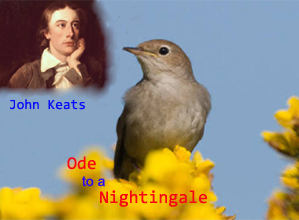
The nightingale has freedom and a sense of the supernatural.Paradoxically – his distress is a result of being too happy.The pain the persona feels is sluggish.Romantic notion – loss of sensation = death.Feeling of numbness is linked to taking ‘hemlock’ or an ‘opiate’.
 What qualities does the poet ascribe to the nightingale?.
What qualities does the poet ascribe to the nightingale?.  Consider whether pleasure can be so intense that, paradoxically, it either numbs us or causes pain. As you read, pick out which words express his pleasure and which ones express his pain and which words express his intense feeling and which his numbed feeling. the occurrence of an insight or vision, a resolution or decision, which signals a return to the scene originally described, but with a new perspective created by the intervening meditation. an extended meditation, which the scene stimulates, and which may be focused on a private problem or a universal situation or both. the description of a particularised outer natural scene. There are usually three elements in a Romantic Ode:. The eighth line is written in iambic trimetre which means it has only three stresses in the line, not five.
Consider whether pleasure can be so intense that, paradoxically, it either numbs us or causes pain. As you read, pick out which words express his pleasure and which ones express his pain and which words express his intense feeling and which his numbed feeling. the occurrence of an insight or vision, a resolution or decision, which signals a return to the scene originally described, but with a new perspective created by the intervening meditation. an extended meditation, which the scene stimulates, and which may be focused on a private problem or a universal situation or both. the description of a particularised outer natural scene. There are usually three elements in a Romantic Ode:. The eighth line is written in iambic trimetre which means it has only three stresses in the line, not five. 
The poem has eight separate stanzas of ten lines each, and the metre of each line in the stanza, except for the eighth, is iambic pentametre."Ode to a Nightingale" is notable for being the longest of Keats's six "Great Odes." It is also often considered the most personal, with its reflections on death and the stresses of life.In general, a Horatian ode has a consistent stanza length and metre. "Ode to a Nightingale" is a particular kind of ode – a Horatian ode, after the Roman poet Horace.

The ode is an Ancient Greek song performed at formal occasions, usually in praise of its subject. Keats and his Romantic peers almost single-handedly revived the ode form for modern readers with poems like. In his poems he asks: How do we live our lives once we realize that “the world is full of misery and heartbreak, pain, sickness, and oppression”?. Keats’ poems wrestle with the problem of evil and suffering. Keats was too ill and too poor to marry the love of his life, Fanny Brawne. Tragic life: Father died when Keats was 8 (fell off horse), mother died when Keats was 14 (TB), left impoverished, several siblings died of TB. Like many Romantic Era poets (such as Shelley, who drowned, and Byron, TB), Keats lived a tragic life and died young.








 0 kommentar(er)
0 kommentar(er)
